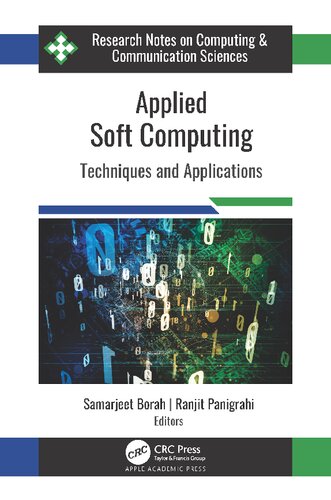

Most ebook files are in PDF format, so you can easily read them using various software such as Foxit Reader or directly on the Google Chrome browser.
Some ebook files are released by publishers in other formats such as .awz, .mobi, .epub, .fb2, etc. You may need to install specific software to read these formats on mobile/PC, such as Calibre.
Please read the tutorial at this link: https://ebookbell.com/faq
We offer FREE conversion to the popular formats you request; however, this may take some time. Therefore, right after payment, please email us, and we will try to provide the service as quickly as possible.
For some exceptional file formats or broken links (if any), please refrain from opening any disputes. Instead, email us first, and we will try to assist within a maximum of 6 hours.
EbookBell Team

0.0
0 reviewsThe book is incomplete- several pages are blanked by the publisher
Applied Soft Computing: Techniques and Applications explores a variety of modern techniques that deal with estimated models and give resolutions to complex real-life issues. Involving the concepts and practices of soft computing in conjunction with other frontier research domains, this book explores a variety of modern applications in soft computing, including bioinspired computing, reconfigurable computing, fuzzy logic, fusion-based learning, intelligent healthcare systems, bioinformatics, data mining, functional approximation, genetic and evolutionary algorithms, hybrid models, machine learning, meta heuristics, neuro fuzzy system, and optimization principles. The book acts as a reference book for AI developers, researchers, and academicians as it addresses the recent technological developments in the field of soft computing.
Soft computing has played a crucial role not only with the theoretical paradigms but is also popular for its pivotal role for designing a large variety of expert systems and artificial intelligent-based applications. Beginning with the basics of soft computing, this book deeply covers applications of soft computing in areas such as approximate reasoning, artificial neural networks, Bayesian networks, big data analytics, bioinformatics, cloud computing, control systems, data mining, functional approximation, fuzzy logic, genetic and evolutionary algorithms, hybrid models, machine learning, meta heuristics, neuro fuzzy system, optimization, randomized searches, and swarm intelligence.
This book is destined for a wide range of readers who wish to learn applications of soft computing approaches. It will be useful for academicians, researchers, students, and machine learning experts who use soft computing techniques and algorithms to develop cutting-edge artificial intelligence-based applications.